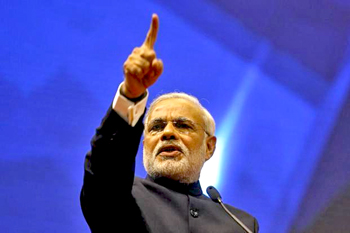Pune, Feb 14: Ahead of the Budget, Prime Minister Narendra Modi today assured investors more reforms as he rolled out the red carpet to multinationals, inviting them to make use of the large pool of highly talented youth in the country.
 "I invite all those who want to participate in the economic development of the country to generate employment for our youth. Your (investors) growth is also linked to our growth," the Prime Minister said.
"I invite all those who want to participate in the economic development of the country to generate employment for our youth. Your (investors) growth is also linked to our growth," the Prime Minister said.
"In this age of competitive world, I assure corporates across the world that India is a land where they can find talents which can help them manufacture products that are very competitive," Modi told a select audience of corporates.
The Prime Minister was inaugurating the multimodal manufacturing facility set up by the American engineering giant GE Corporation.
Calling upon the investors to utilise the talent of large educated youth population, he said, "we have the highest demographic dividend, as 65 per cent of our population are below 35 years. Our talented youth have power to attract investments from across the world. Our skill power can also attract the investors."
Modi also assured his administration will improve the ease of doing business. He said the number of clearances for setting up a hospitality venture will be brought down from a massive 110 to just about 20.
"Our government has ensured predictability in our procedures, laws and policies. We have also taken many initiatives towards ease of doing business," Modi said.
The NDA government will present the first full Budget on February 28 with some analysts wondering whether it would be a complete reform oriented budget following the defeat of BJP faced in the last week's Delhi elections.
"India economy is the fastest growing economy in the world with a GDP growth rate of 7.4 per cent. We have to sustain it and take it forward and for that we are emphasising on three sectors -- manufacturing, agriculture and service sector," the Prime Minister said.
He said, there are tremendous opportunities in the manufacturing sector in India.
Modi said the Maharashtra government led by Chief Minister Devendra Fadnavis was also focusing on ease of doing business for investors keen to explore business opportunities in his state.
Recalling his experience at the CEOs meeting during US President Barack Obama's visit last month, PM Modi said the representatives of the hospitality industry expressed concern over the several clearances required in the sector though they were keen on entering the Indian market.
"Number of permissions needed to set up hospitality industry is being brought down from 110 to 20," he said.
"India offers immense opportunities for ship-building sector," Modi said and invited US-based GE to manufacture ships in the country.
He said his government's effort is to make policies predictable to attract investments as he believes that good governance is a guarantee for development.
He also said that GE and other global firms should invest in the defence sector as the government has increased the FDI or foreign direct investment threshold to 49 per cent.
We want to move further ahead in the manufacturing sector, he said.
"We want Railways sector in India to develop, get more technology, give speed and make it the driving force of our economy," he added. Reiterating his government's commitment to reforms, Modi said, "in the last few months the government has initiated many reforms which are attracting investors from across the world. I firmly believe that the 21st century will of Asia and India will play a crucial role in it."
"Good governance is the guarantee for development. Ease of doing business is one of the key thrust areas of my government," Modi, who came to power on the promise of good governance and development, said.
Dedicating the GE facility, Modi congratulated the company for setting up such a huge manufacturing facility at Chakan near hear and also complemented the American multinational for its commitment to the country.
He said this move will give a boost to his government's flagship 'Make in India' campaign.
"We have immense opportunities in ship-building and defence sectors. I invite GE to invest in the defence and ship-building sectors," he said.
Pointing to his ambitious make in India drive, the Prime Minister said the country wants the manufacturing sector, which today contributes only under 16 percent to GDP, to grow
The previous government had set an ambitious target of taking the share of manufacturing to 25 percent of GDP by 2020 and projected USD 1 trillion investment into infrastructure space, especially ports, airports and railroads and highways, to enable this.
Modi also stressed on sustainable development and economic growth, saying for that to happen "we are focusing on manufacturing, agriculture and services sector,".
He said there was immense opportunities in the manufacturing sector. On the railway development, he said the country's railway network, which is one of the largest in the world, can become the economy's driving force.
"I want India to become self-sufficient in Railways, and upgrade the technologies used in the sector. Rail sector can become driving force for the country's economy," he said.







Comments
Add new comment